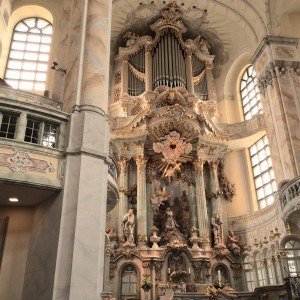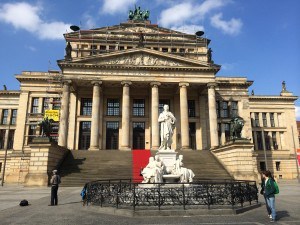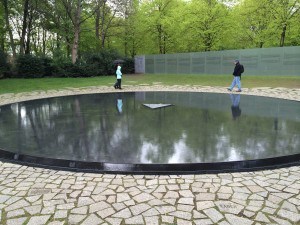As I have often remarked on this blog, the European Union plays the tortoise in Aesop’s fable to the United States’ hare. The EU’s forward motion is imperceptible and it is easy to make fun of it, compared to the easy strides made by its American counterpart. And yet when reviewed over the long term, progress is dramatic. At the moment we are witnessing an ugly row in the EU about who should be the President of the European Commission. This follows a rather dramatic election to the European Parliament (EP) in which Eurosceptic and populist parties made big advances, not least here in the United Kingdom. But these apparently discouraging could mask a major advance by the parliament.
At the centre of this drama is the problem referred to as the EU’s democratic deficit. A large proportion of the member states’ laws (to say nothing of most European non-members likes Switzerland and Norway) are now derived from the EU’s federal institutions. These are led by the Commission. These laws, and the Commission itself, do not seem to be subject to the same standard of democratic challenge and accountability that people have come to expect in a democratic polity. EU laws are presented as impositions from outside from an unaccountable bureaucracy. Two EU institutions are meant to provide democratic legitimacy. Firstly there is the European Council, consisting of the heads of government of all member states. This works mainly by a system of qualified majority voting, so that laws can only be approved with substantial inter-state coalitions. Some areas require unanimity. There are two problems. First, its attention span is necessarily short, so there is a limit to the extent of any detailed scrutiny – though this is improved by delegation to more junior ministerial meetings. A bigger problem is that the public perceive their deliberations to be wheeler-dealing: an unseemly process of stitching voters up. Prime Ministers do not have their voting records at the Council examined in the way that US Senators do, and they easily pass decisions off as not being theirs.
The second institution meant to provide democratic legitimacy is, of course, the EP. European federalists see this institution to be the forerunner of an active federal parliament, like the US House of Representatives. So far it has been a disappointment. Elections have drawn a low turnout; there is little awareness among voters about what it does; voting is dominated by national politics. There is no “European polity” that forms the basis of its legitimacy, where there plainly is an American one for the House of Representatives.
European federalists have sought to address this problem by making the EP matter more. First it was given greater legislative power; its importance has risen to such an extent that its members are now subject to extensive lobbying by commercial and other interest groups – but the public has barely noticed. Who cares about the finer points of intellectual property or bank regulation, after all? Their next idea was to give it a bigger say in the selection of the President of the Commission – the nearest thing the EU has to a Prime Minister. Their idea was that each of the transnational political groups into which MEPs are organised would select a leading candidate, referred to by the German word Spitzenkandidat. The Spitzenkandidat of the largest party would be nominated to be President. This is the way Germany picks its Chancellor, and also the way Britain picks its Prime Minister. The winner of this process turned out to be Jean-Claude Juncker, the former Prime Minister of Luxembourg.
Here in Britain this process has been observed with a mixture of contempt and disdain by the political elite. It is nonsense to suggest that voters were picking one the Spitzenkandidaten when they were voting, they say. Mr Juncker’s nomination has no democratic foundation. And besides we don’t like him. One British journalist claims that this is no better a way of running the Commission, than monetary union was for running Europe’s economy, following the British elite’s view that the Euro has been a disaster (gently skating over their own country’s own troubles outside the Euro zone). David Cameron has led the charge to dismiss this process and pick somebody else, who would be more “reform-minded”. He has at least tacit support from other party leaders here, and in a few other EU countries. But this stand is looking increasingly costly, expending Mr Cameron’s diminishing stock of political capital within the EU. He has been out-manoeuvred, and it is likely that Mr Juncker will get the job.
Much of the criticism emerging from British commentators is true. Mr Juncker does not inspire confidence as the man to take the EU forward to something that will function better. The EP does not represent the will of a European polity. The battle of the Spitzenkandidaten never took off in the election debates. But they have missed two important points.
The first is that this years’ EP elections were a major political event, right across the union. Turnout remained low, but it was actually up on the previous election in 2009. The combination of it being seen as an election whose consequences are relatively weightless, and the use of proportional representation, have made the outcome unpredictable and dramatic. The rise of populist political parties has enlivened the election, and have given electors a voice that they would have been otherwise denied. This invites a crisis of confidence in the EU, but, paradoxically, it gives the EP a greater degree of legitimacy. The election results in the UK were described as a political earthquake. No longer are the elections a sleep-inducing irrelevance, but they have become an important test of the political temperature. Some of the consequences are ugly; mainstream politicians are pandering to the populists, allowing racism to make a comeback. But it puts the EP on the political map.
The second point that British critics miss is that the argument over Spitzenkandidaten is not about the present; it is about the future. The current candidate may have no democratic legitimacy, but in order for future ones acquire that legitimacy it is necessary for us to behave as if they did. This is not about the election in 2014, but the one in 2019. The tortoise beats the hare because he focuses relentlessly on the ultimate goal, while the hare is distracted by the issues of the moment.
Should we applaud this turn of events? The EP has taken a great step forward. There may be no sign of a European polity yet, but each of the national delegations has greater democratic legitimacy with their own national polities. That is a clear step along the path. Does the EP provide the answer to Europe’s democratic deficit? Or should it be abolished? Abolition is not an option for now. And the EP may provide part of the answer.
But we should remember one thing. In order to judge the success of the EU and its institutions we must look over the long term. While currency union has endured almost unbearable stress, it is much too early to write it off as a failure. As the EU stumbles forward into unmapped ground, the same must be said for the European Parliament.


